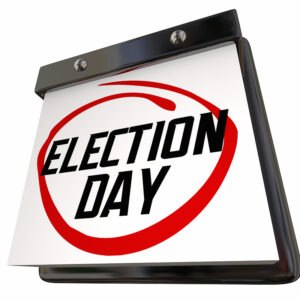A Senate bill to move New Hampshire’s last-in-the-nation state primary from mid-September to the second Tuesday in June received a 10-10 vote from the House Election Law Committee on Tuesday. It now heads to the House floor without a committee recommendation.
The bill (SB 380) also faced a new critique from House Democrats who oppose changing the date. They claim Granite Staters would be overwhelmed by a “nonstop election season.”
“At what point do families get a break from political ads, from mailers, from yard signs?” state Rep. Angela Brennan (D-Bow), a member of the House Election Law Committee, said during the panel’s consideration of the proposal. “This would have a huge real-world impact on our constituents.”
Committee chair Ross Berry, who supports the move, laughed off that argument.
“Nonstop campaigning — Chuck Morse, Kelly Ayotte, Cinde Warmington, Joyce Craig — they’ve all been running for governor now for about a year,” Berry said, referring to the candidates hoping to succeed outgoing Gov. Chris Sununu. “This notion that this nonstop campaigning is going to be a ‘thing?’ Welcome to 2024. It’s a thing. It’s already happening.”
Democratic motives for opposing a June primary are an open secret in New Hampshire political circles: incumbent protection. With all four federal offices in Democratic hands — and a party that rarely holds competitive primaries — keeping Republicans battling it out until two months before the general election is a natural advantage.
This year’s New Hampshire primary won’t be until Sept. 10, the same day as stragglers Delaware and Rhode Island. In fact, no state will choose its nominees later than New Hampshire. (All dates come from the Federal Election Commission calendar.)
There have been some efforts to move the primary to August. But Gov. Chris Sununu has vetoed that idea once, and according to Sen. Tim Lang (R-Sanborton), he’s prepared to do it again.
“He’s in favor of a June primary,” said Lang, a sponsor of the Senate bill. “August just isn’t going to work, whether it’s because of vacations or because it’s the middle of tourism season when so many residents are busy working.”
Lang told NHJournal he submitted the bill after meeting with Sununu. And like Berry, he mocked the “nonstop elections” complaints.
“During an election year like this one, from January on, we already have nonstop campaigning anyway,” Lang said. He also noted that their complaint was about themselves, not the voters.
“It wasn’t about giving them more time to vet the candidates or access absentee ballots,” Lang said. “Their ‘poor me’ argument wasn’t about whether uniformed or overseas (UOCAVA) voters have enough time between the primary and the general to get their absentee ballots mailed in.”
The Senate passed SB-380 in February. Tuesday’s House hearing on the legislation saw Brennan repeatedly raise concerns about a “real world impact” on residents.
Brennan acknowledged the “quick turnaround” between the state primary and general election, especially for top-of-the-ticket candidates in races for Congress or the governor’s office. But she argued that it’s different for the House, which is busy with people’s business in May and June.
“I understand it would be better for [federal] candidates, but what about our citizen legislature that we are so proud of here in New Hampshire?” Brennan asked. “Does this not make it more difficult for them to run and serve in the state legislature when in the second year of the biennium (term) they would be still in the middle of legislative work?”
Berry was unimpressed, noting just three of the state’s 400 House members lost primary challenges in 2022.
“Incumbents are rarely primaried, and it’s almost never successful,” Berry said.
Meanwhile, he said, the current system gives Democrats a huge advantage in federal elections.
“Forty seven percent of New Hampshire citizens who are Republicans have been represented five percent of the time in congressional races over the last 10 years,” Berry noted. “One of the biggest reasons why is because we have a laughably late primary of 45 days, and the money that would then go to support the 47 percent that have consistently voted Republican doesn’t come because we have set up an ‘incumbent protection plan.’
“I am about ending the incumbent protection plan.”
A June primary date would also not be uncommon, as 14 states, plus Washington, D.C., and Puerto Rico, currently hold their primaries in June, more than any other month.
“June is the option, June is the way forward, and in the words of the Mandalorian, ‘this is the way,’” Berry said.





